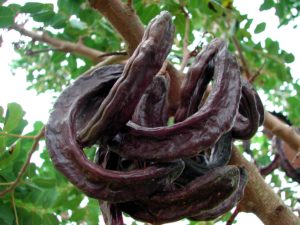Locust Bean Gum is a thickening agent and a gelling agent used in food technology.
Contents
Uses
- The bean, when made into powder, is sweet—with a flavor similar to chocolate—and is used to sweeten foods and as a chocolate substitute, although this carob powder is produced from the fruit pod after removal of seeds, while the gum is produced from the seeds themselves. It is also used in pet foods and inedible products such as mining products, paper making, and to thicken textiles. It is used in cosmetics and to enhance the flavor of cigarettes. Shoe polish and insecticides also have locust bean gum powder as an additive. It is soluble in hot water.
Benefits
- May Help Lower Cholesterol: Studies have shown that locust bean gum may have potential cholesterol-lowering effects on its consumers.
- Improves Blood Sugar Levels: An animal study published in the journal Phytotherapy Research looked at the effects of both guar gum and locust bean gum on blood glucose and insulin levels.
- Treats Gastroesophageal Reflux Disease (GERD):A study published in the Journal of Pediatric Gastroenterology and Nutritionlooked at the effects of consuming an anti-regurgitant milk containing locust bean gum on 30 infant subjects experiencing regurgitation on a daily basis who had no other health issues.
- Relieves Diarrhea: Scientific research has shown that locust (carob) bean gum can be helpful to dehydrating and nutrient-depleting diarrhea.
- Potentially Discourages Colon Cancer: Due to its significant fiber content, it’s believed that carob bean gum may discourage the formation of colon cancer.
Cautions
- Locust bean gum appears to be safe for most people in normal dietary amounts, and according to the Food and Drug Administration, “There is no evidence that consumption of carob bean gum by man since 1925, when it was first used in the United States, has had adverse effects.”
- In high doses, it does seem to be toxic to some pregnant animals, however — though animal studies have shown that long-term (two-year) intake (5 percent of diet) of LBG does not result in any toxic or carcinogenic effects.
- On the negative side, a very small study several decades ago did show that carob bean gum may interfere with the absorption of vital nutrients.
Interactions
- Not known.
Other names
- carob gum, carob bean gum, carobin, E410
References
Source: Wikipedia, https://en.wikipedia.org/wiki/Locust_bean_gum

